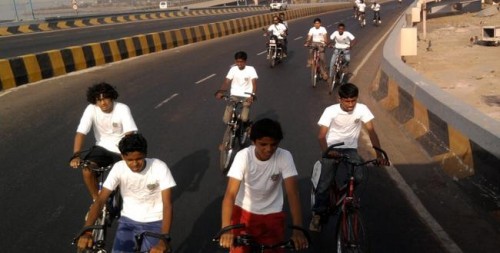Mumbai is one of the top ten most polluted cities in the world, according to the World Health Organisation (WHO). With the rise of the middle class, more and more people are buying cars, scooters and motor bikes, and despite government efforts to limit motor rickshaws to the suburbs, their sheer number contributes to the pall in Mumbai.
But two university students are bringing some hope of fresh air; they’ve launched Mumbai’s first bike-sharing system, Cycle Chalao – which translates into “ride a bike” – in an effort to encourage people to pedal their own transport, rather than opting for a diesel guzzling cab or auto rickshaw.
Raj Janagam and Jui Gangancame up with Cycle Chalao as part of a social entrepreneurship project at university. The idea was born out of the kind of day-to-day frustrations familiar to any Mumbai commuter: “It’s so difficult to find a rickshaw for short distances in the city. I often used to get into fights with the rickshaw drivers and spent precious time waiting for rickshaw rides,” Jui says.
It’s after one of these fights that Jui and Raj came up with the idea of riding bikes over short distances instead of hunting for rickshaws.
Multiple modes
According to Jui Mumbai commuters often have to take different types of transport every day: “Normally people take a train or a bus for covering longer distances and then a fifteen-minute taxi or rickshaw ride for the second half of the journey.” Raj and Jui hoped that Cycle Chalao would replace these second, short rickshaw and taxi journeys.
“It is quite frustrating to go fishing for rickshaws when you want to be on time for work. Cycle Chalao just offers a convenient approach. The green-clean nature of these bike rides is a by-product for the service we offer,” Jui says.
Successful pilot
Cycle Chalao conducted a two month-long pilot in Mumbai’s eastern suburbs of Mulund to gauge the public response. They installed 30 bikes at Mulund railway station and targeted students travelling to a nearby college.
The bikes were rented out against the students’ college ID cards through subscriptions. A bike ride costs Rs. 3, less than one euro cent. “A rickshaw ride would cost four to five times that much. So we had nearly 700 unique users in two months. We marketed as being a cheaper, healthier and greener alternative,” Jui says.
The project has, however, been successful in Mulund mainly because of bike-friendly streets, a rarity in Mumbai. “Traffic is crazy here. There’s no scope for bike lanes. Streets are congested. We know that the only way we can make this work is by spotting the less congested streets to promote the campaign,” the 23-year-old management student says, adding that they have been able to narrow down 70 such routes in Mumbai which could potentially have Cycle Chalao stands.
Scaling up
And the youngsters have broadened their scope. In a few months, the project will launch in Pune, a neighbouring city, as part of the city council’s initiative to reduce the numbers of vehicles on the street. The Pune project is a pilot to test if Indians would like to bike their way around other cities.
It is difficult for Cycle Chalao to scale up its operations. Until now, its financial model has been self-sustaining. “That’s because our stands are manual. We earn from subscriptions and advertisements on the bikes. We have people manning them, taking the ID cards, renting out bikes etc. It can’t remain this way if we want to introduce it on a larger scale. Then we would need automatic stands. That would mean a lot more infrastructure and essentially more funds,” Jui explains.
A few years ago, it would have been hard to imagine middle class Mumbaikars cycling to work. But similar schemes have worked very well in London, Paris and Amsterdam, and now that the government and even corporate entities seem to be interested in the idea, it could well be the next Big Thing to hit a city where just about everyone is fed up with not being able to move around as fast as they would like.
If you found our stories insightful, informative, or even just enjoyable, we invite you to consider making a voluntary payment to support the work we do at The Better India. Your contribution helps us continue producing quality content that educates, inspires, and drives positive change.
Choose one of the payment options below for your contribution-
By paying for the stories you value, you directly contribute to sustaining our efforts focused on making a difference in the world. Together, let's ensure that impactful stories continue to be told and shared, enriching lives and communities alike.
Thank you for your support. Here are some frequently asked questions you might find helpful to know why you are contributing?

